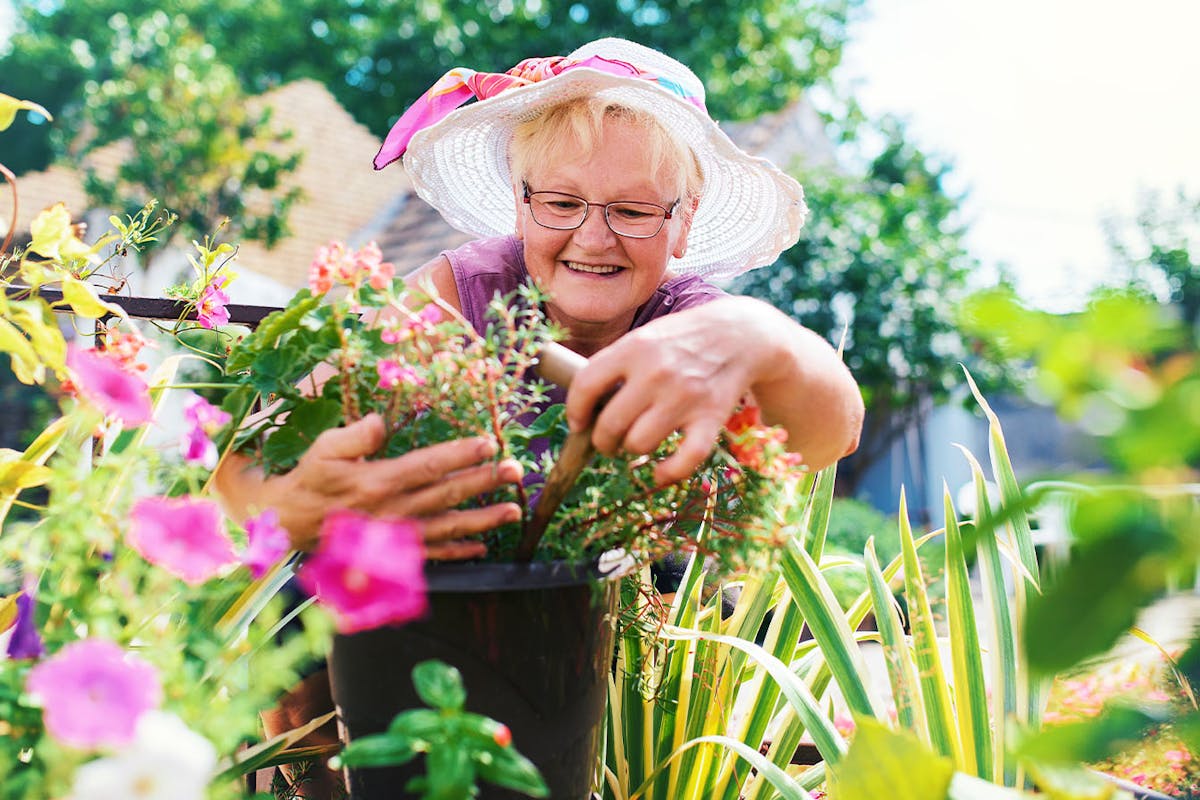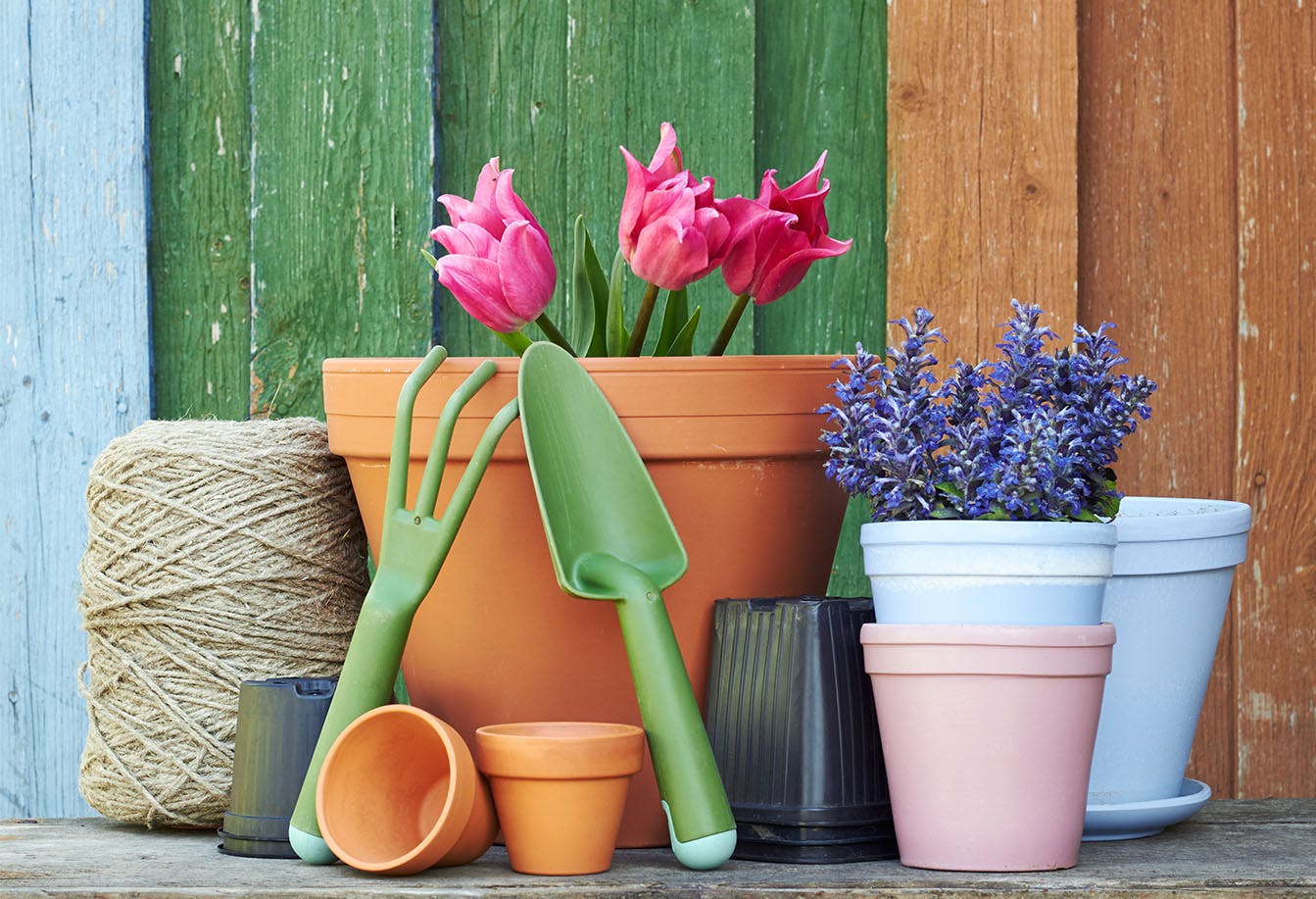Container Gardening Tips for Older Adults

Spending time in the great outdoors can provide a boost to the body, mind, and spirit. This is especially true for older adults who have been cooped up indoors and alone during the COVID-19 crisis. Even with a little outdoor space, a senior can plant and tend a garden. It can be as simple as purchasing a few containers to grow herbs, vegetables, or flowers in.
The health benefits of gardening are numerous. It helps the gardener lower blood pressure, maintain core strength, and beat stress. That’s in addition to the more obvious rewards of planting a garden—enjoying fresh flowers or vegetables all summer long.
Staying safe while gardening can be a little more challenging as you grow older, but there are ways to adapt. Here are a few tips you can use to plant a senior-friendly garden, from setting up raised beds to choosing the right containers.
Container Gardening and the Older Adult
Containers of all sizes and shapes, as well as window boxes, make for easy-to-reach gardens. Opt for resin or pots made with a plastic blend instead of concrete or terra cotta planters. They’ll be lighter and easier for an older adult to move around.
Depending on your preference, you can grow vegetables, herbs, and flowers in containers. Here are a few ideas for growing in container gardens:
- Good soil: The foundation of a thriving container garden is healthy soil. For containers, an organic material that holds water is best. Check your local garden centers to see if they carry a region-specific mix. It’s a good way to ensure the soil you use is appropriate for where you live. If you can’t find one, most home improvement stores sell prepackaged potting soil offered by name brands like Miracle-Gro. Look for one specifically designed to use in container gardens.
- Proper drainage: Good drainage helps keep the roots of the plant from rotting. If your container lacks drainage holes and it’s not possible to add them, you’ll need to create your own way of preventing roots from sitting in water. One easy method is to cover the bottom of the pot with a thin layer of stone or gravel.
- Plant choices: Which plants you can use will depend on whether the containers will be placed in sun or shade. Search your local greenhouse websites for ideas on sun or shade flowers. A rule of thumb for each pot is to choose a thriller, a spiller, and a filler—a taller flower or vegetable to catch the eye, a trailing plant or vine to spill over the edge, and medium-sized plants to fill in.
Another option to consider if you are an older gardener is an elevated bed. They are available in a variety of styles at different price points.

Elevated Garden Beds
Growing a garden in a raised or elevated bed is another solution, especially for older adults who struggle with balance or mobility. Home improvement stores and online garden stores sell kits that require minimal assembly.
A few tips to help you plan your raised beds include:
- Location: Are you hoping to grow plants or flowers that require full sun or those that prefer shade? Make sure the location you choose to place your bed is a match for what you want to grow in it.
- Depth: Experts say raised beds should be deep enough to allow for 6–12 inches of dirt. If you live in a hotter climate, you likely need more soil than in cooler regions. Soil that combines topsoil with coconut coir (for drainage) and compost often works best in elevated garden beds. After planting, you can add a layer mulch on top to prevent the bed from drying out as quickly.
- Drainage: Like container gardens, raised beds need to drain properly. If the bottom of your raised garden bed doesn’t have holes, be sure to drill some. A layer of crushed stone or pea gravel might also help.
- Plants: If you are interested in creating a vegetable garden, you’ll have lots of choices for plants. Root vegetables, such as carrots, radishes, and beets, thrive in raised beds. Leafy greens are another option.
One final tip is to remember to water a raised bed or container garden often. They’ll need more water than plants placed directly in the ground.
Feel Safer While Gardening
Whether you choose to create a traditional garden or grow one in containers, it’s important to stay safe. Drink water, and wear sunscreen and a hat that shields your face.
It may also help to invest in an emergency medical alert system, like our Mobile Monitoring Unit. If you experience a fall or start to feel unwell, you can call for help with the push of a button. Call (844) 203-5617 for more details!